An RV tire pressure monitoring system (TPMS) is an absolute necessity for every owner.
Of course, you don’t want your trip cut short rudely by a flat tire or worse still, by a freak accident because of low pressure.
In this we’ll review 11 of the best RV tire pressure monitoring system in the market these days.
Plus, we shall tackle pretty much everything you need to know about recreational vehicle tire pressure monitoring systems including proper installation.
I want to save your time so let’s get going.
We researched and tested dozens of brands so that you don’t have to waste your time and bucks on helpless trial and error.
As compensation, Amazon and others will give us a small commission when you click on the links here and better your life with a purchase. This comes at absolutely no extra cost to you.
11 Best Tire Pressure Monitoring System for RV Review
First, we check out some of the best rv tpms options on the market.
Editor's pick
Image | Name | Editor's Remark | Price |
|---|---|---|---|
1. 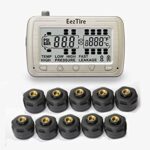 | - Easy to use and setup - Monitors tire pressure and temperature for up to 26 tires | ||
2. 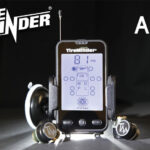 | - Easy to use and fast response - Good battery life | ||
3. 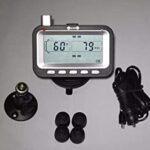 | - Unmatched sensor range |
1. EeZTire Tire Pressure Monitoring System
- Impressive battery life.
- Extremely easy to use and setup.
- Nice, programmable alerts.
- Well-designed anti-theft caps.
- Not the most affordable RV TPMS system out there.
For the best tire monitoring system for your cars and trucks, see our review of the best TPMS tool in 2024.
2. TireMinder A1A TPMS
- Easy to install.
- Top, top quality construction.
- Outstanding customer service from the seller.
- Great display size.
- No major issues were noted.
3. BELLACORP RV Tire Pressure Monitoring System TPMS, 4 Sensors (plus Free $50.00 Repeater)
- Unbeatable range.
- Anti-theft caps design.
- The alarm goes on as soon as pressure rises above or drops below preset levels.
- Straightforward installation.
- We are struggling to find a weakness.
4. TireMinder Smart TPMS (with 6 Transmitters) for RVs, 5th Wheels, MotorHomes, Motor Coaches & Trailers
- Bluetooth adapter included.
- Anti-theft locking nuts.
- Very accurate.
- Works like a charm.
- The app will need to be updated occasionally for smooth functioning.
5. Blueskysea Solar Powered Wireless TPMS, 6 External Sensors for Car RV Tow Trailer- best solar TPMS
- Sends data super-fast.
- Easy to use.
- Flexible power options.
- Top-quality control.
- Wish the company drafted better installation instructions.
6. Truck System Technologies RV TPMS TST507
- Works very well.
- Easy to program.
- Anti-theft feature.
- Amazing color display.
- Costlier
7. INFITARY RVs TPMS -Tire Pressure Monitoring System
- Easy to install (video guide available).
- Large wide-angle screen.
- Clear and timely data.
- Can support 22 sensors (maximum).
- Not that easy to program.
8. Tymate Wireless TPMS -Tire Pressure Monitoring System, 4pcs External Sensors –best RV aftermarket TPMS
- Easy setup prompts.
- Very reasonable price.
- USB port (charge your phone).
- Accurate information.
- Readings display not so large.
9. ZEEPIN Solar Powered Wireless TPMS Tire Pressure Monitoring System- best wireless TPMS
- Anti-theft technology.
- Good accuracy.
- Topnotch Sensors (waterproof and won’t rust).
- Easy to mount.
- Can sometimes delay ‘wake up’.
10. BARTUN Bluetooth, Wireless RV Tire Pressure Monitoring System –best Bluetooth TPMS
- Works as expected.
- Well written instructions.
- Amazing app.
- Include anti-theft screws.
- Slow customer support.
11. Tire-Safeguard RV Flow-Through Sensor 6-Tire Tire Pressure Monitoring System
- User-replaceable sensor batteries.
- Long-range sensors (no need for signal booster).
- Precise PSI readings.
- Flawless quality.
- Wanting customer service.
What is a TPMS?
An RV Tire Pressure Monitoring System is an electronic system that continuously reads and communicates air pressure levels inside the RV tires.
It mostly relies on sensors – the number of sensors differs from one model to the next- to detect tire pressure and other information such as tire temperature and relay it to you via a digital display.
It will pass warnings to you in the form of light alerts, beeps, messages, or even voice announcements when it diagnoses low pressure or other problems such as the tires overheating.
Why you need a TPMS for your trailer
A TPMS is an indispensable safety tool for your trailer because it constantly keeps tabs on all the trailer tires as you head out for your annual summer vacation together with the family.
Like I mentioned previously, losing a tire at breakneck speed can lead to nasty results.
Moreover, a blowout could cause your trailer to swerve and possibly roll over, again with terrible outcomes.
In any case, we, RVers, are never too far from tire trouble particularly when out there in the middle of nowhere.
Now, the best rv tire pressure monitoring system will watch your back and warn you when your tires (and you) are at risk because of under-inflation, slow puncture, adverse wear, and more.
That can be life-saving.
There are other benefits such as improved fuel efficiency.
The last thing you should understand is that for trailers, your tire-pressure monitor can either be of flow-through design or pressure-cap style.
Both measure actual air pressure pretty much like direct TPMSs (more on this below) meaning that you’re guaranteed the highest accuracy.
Types of RV tire pressure monitoring systems
Another vital decision is whether you should pick a direct or an indirect RV tire pressure monitoring system.
Here is what you should know:
- A direct tire pressure monitoring system has sensors inside every tire that track movements in pressure levels.
- Indirect TPMS take their measurements via the anti-lock braking system (ABS) in your vehicle. Subsequently, you need to calibrate it beforehand for it to monitor properly.
Needless to say, the question remains: should I take direct or indirect TPMS?
Well, for the most part, direct RV TPMS systems have better accuracy because they use physical sensors in the tire.
Their other advantage is that they’re more customizable when it comes to pressure and other settings.
However:
They tend to be pricier.
In conclusion, despite their accuracy issues, indirect TPMS’s have their strengths including minimal programming but the biggest of them all is their affordability.
A Buyers Guide for the best TPMS for RV
As a budding RV TPMS buyer, there are things you must keep in mind when shopping.
We show you how to choose the right one for your needs in this section.
(i) Power issues
Your device needs to be powered in order to function, so it’s helpful if it comes with batteries that last.
Plus, it’s beneficial if it lets you change the sensor batteries when needed without much fuss.
On the same note, some of the best tpms for rv comes with rechargeable batteries.
This option will save you the battery replacement expense and is worth considering where available.
(ii) Accuracy of the RV TPMS system
Low pressure contributes to a worrying number of accidents and you want a model that’s super precise in reading and reporting changes in the tire pressure and temperature.
The good thing is that manufacturers are now inventing TPMS systems with unique precision and alert systems.
A good example is the Precision Direction System used in brands such as Zeepin.
Select these types, if possible.
(iii) Quality of the display
The display should be clear and hassle-free to read.
Larger displays carry the day here especially the colored ones (backlit).
Another nice feature is having the screen display the readings in larger fonts.
(iv) Setup/operation
Setting up your TPMS should be a breeze and the system should be made such that even a caveman can do the job but this isn’t always true.
Some units are really a pain and you would do well to research each unit’s installation procedure and steer clear of troublesome tools.
Likewise, it’s best you go for a system with simple controls- this is easy to learn (and operate) and will save you plenty of time and potential headaches.
(v) Sensor construction
Sensors constructed to be waterproof and not to corrode are going to withstand harsh treatment and will serve for longer.
Still, on sensors, the use of anti-theft technology in sensors can save you bucks since it slows down thieves.
(vi) Customer support
We occasionally come across sellers who will answer your email after 3 months and you need to shun such vendors.
Remember, some models are so technically advanced (think of those using apps) and you might need help at some point when programming it.
(vii) A word on the use of a booster
But for cases where the seller gifts you a booster free like in the case of the Bellacorp TPMS (reviewed above), it’s pretty clear that buying a repeater/booster is an extra expense.
I was looking at a popular model such as the EeZTire-TPMS System Booster/Repeater and I noted that you have to fork out nearly $100 for the accessory.
This makes me feel that it makes more economic sense to purchase a TPMS system with good signal distance (whenever available) instead of those dependent on boosters.
It could leave some loose change in your pocket.
How to Install a TPMS
RV tire monitoring systems have significant assembly differences and as a result, you rarely find the installation steps of one working for its peer.
But there’s nothing to concern you here since every manufacturer publishes the process in the owner’s manual, website, and on YouTube (in most cases).
They also often pack everything you require for the installation in the product’s package.
And as you will discover when mounting your selection, it rarely takes more than 10 minutes to fit and have it ready.
All you have to do is check the released guidelines and follow them.
Best RV Tire Pressure Monitoring Systems: Frequently Asked Questions (FAQs)
It would be unfair to end this review without tackling some of the questions you might have in mind as far as these systems are concerned.
Q. What are the disadvantages of Bluetooth TPMS
Bluetooth TPMSs have been around for a few years now and have generally been a wonderful invention now that you can monitor everything right from your phone/iPad.
Some users have, however, pointed out some drawbacks with these models. These include:
- Larger caps- the caps in some are fairly long/wide and can affect how the tire looks.
- Installation difficulties- getting the entire pairing process and the remaining setup right is sometimes a tough task.
- Faulty support apps- selected entry-level models have been accused of failing to update the apps for long leading to erratic readings.
- Compatibility hiccups– they fail to work with older Android and Bluetooth standards.
Q. What pressure should my RV tires be?
It varies between different brands but to eliminate guesswork, manufacturers indicate the recommended tire inflation pressure either in a sticker or plate.
Go by what your vehicle’s sticker says.
This could change if you have upgraded the tire size or have other intentions like optimizing the tire pressure.
How does TPMS know which tire is which?
Typically, the TPMS determines the affected tire by having the sensor ‘learn’ the tires and then relay the details in the form of RF signals to the systems control module.
Now, in the majority of the cases, the sensors have a special code that the computerized system recognizes with regards to the position a tire is mounted.
The decoded particulars are also used to identify if a ‘fault’ or ‘warning’ condition is present in a certain tire within the RV TPMS.
What is a range extender/booster and do I need one for my TPMS?
Also called a TPMS repeater/booster, this device amplifies the RF signal from the sensors effectively extending the sensors transmitting distance.
This accessory comes in handy in situations where the length of your motor home or fifth wheel hampers the reception of the signal by the monitor.
Another scenario where a repeater could be practical is when interference from wireless gadgets is messing with the signals (recall that TPMS systems utilize radio signal technology).
Having said that, boosters, are, on the whole, endorsed for use in longer RVs.
How do I test and replace my TPMS sensor battery?
Chances are your TPMS system came with a built-in basic battery monitoring system and this is the best way to test the battery if you suspect it’s dying.
But it’s not that straightforward and you have to use a scan tool for an accurate battery status diagnosis.
The battery strength/status monitor will send the information to the tool and the results will show up on the screen.
For the process to be successful, the sensor must be activated.
There are other DIY methods but none is as effective as using an official tool.
The alternative is to contact a TPMS service technician/dealership and schedule your RV TPMS to be inspected.
Final Words
Investing in the best RV tire pressure monitoring system doesn’t mean that you ignore precautionary procedures such as using top quality RV tires- it will never prevent blowouts anyway!
In addition, always inspect the sidewalls and tread blocks for damage regularly.
Did I mention that you shouldn’t forget to balance and rotate the RV tires frequently?
And obviously, you will not be exceeding the maximum load (gross vehicle weight rating) under any circumstances.
The aforementioned measures plus your new RV TPMS equals more peace of mind.
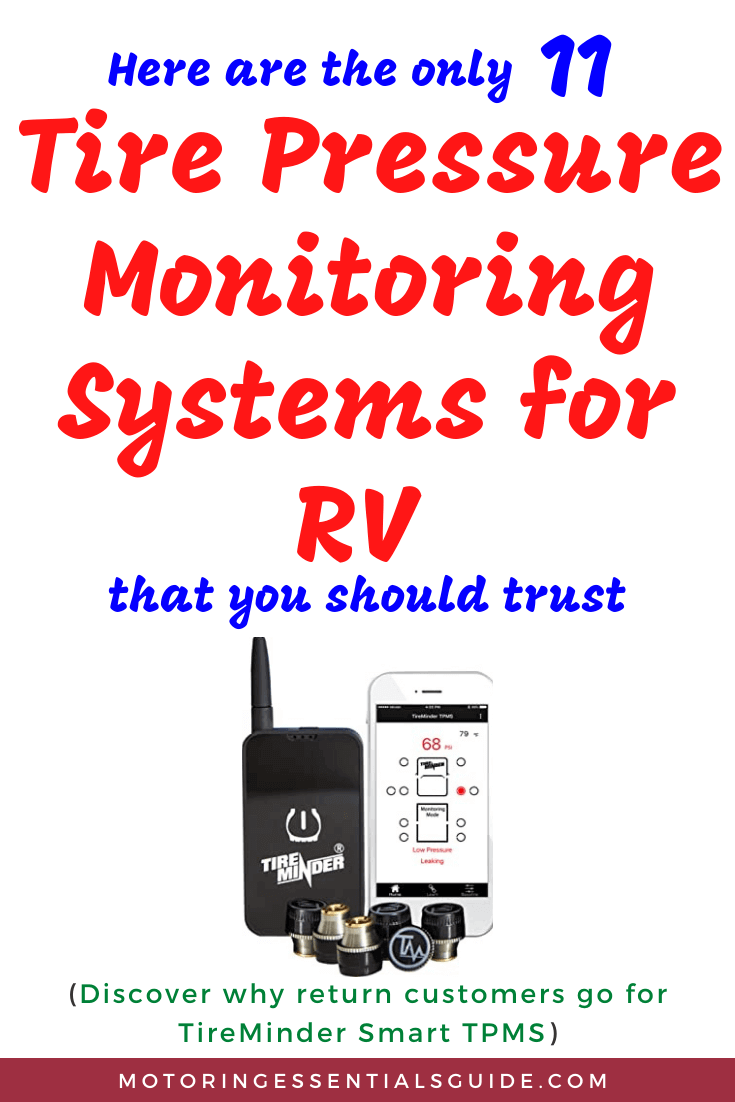
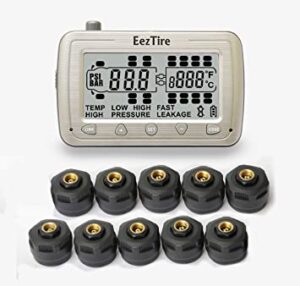
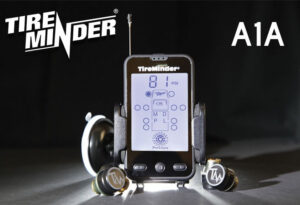
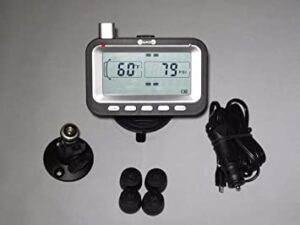
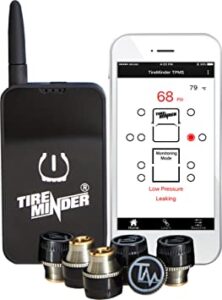
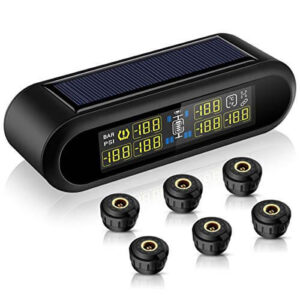
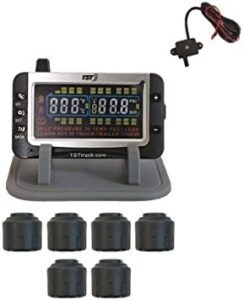
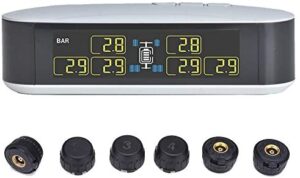
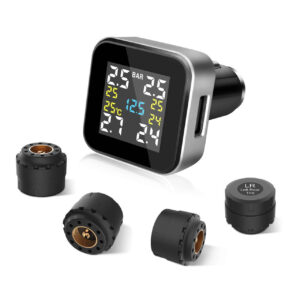
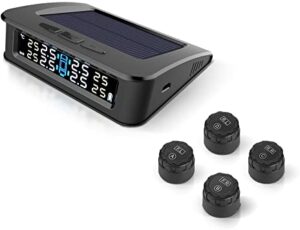

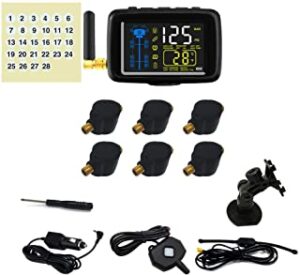
Truck Systems Technology product does an excellent job providing trailer tire pressure and temperature monitoring for our dual axle trailer RV. We ordered the six sensor kit to allow one monitor for the spare tire and one for a backup sensor if one ever gets lost or broken. Instructions were easy to follow, had it set up and working in 25 minutes. Our setup with a pickup truck towing a 25-foot travel trailer did not even require the included booster to function flawlessly. Can already tell our travels have less worry, being able to recognize tire issues before any real problem occurs.
It feels good to know that these systems can keep you alert and assured when you are on the trail